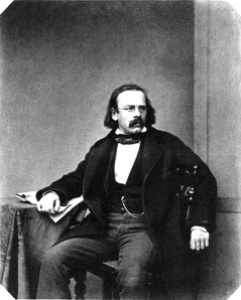Although the pedagogue and author Wilhelm Heinrich von Riehl (1823–97) was not formally trained in music, he wrote extensively about the social significance of music making, and he argued for an approach that treated music history as cultural history. He criticized music histories centered on great composers, and advocated a more inclusive cultural approach that appreciated the unsung heroes and everyday life of the past.
Riehl was even more critical of his own time, lamenting the costs of transforming Germany into a modern industrial society; while he called for a more encompassing definition of Germany’s musical heritage, he rejected all of the art music of the day, and particularly railed against the works of Wagner. Riehl, therefore, is an ambiguous figure: He championed the idea of music as culture, but he explicitly rejected a future for music as art.
This according to Sanna Pederson’s “An early crusader for music as culture: Wilhelm Heinrich Riehl”, an essay included in our recently published Music’s intellectual history.



